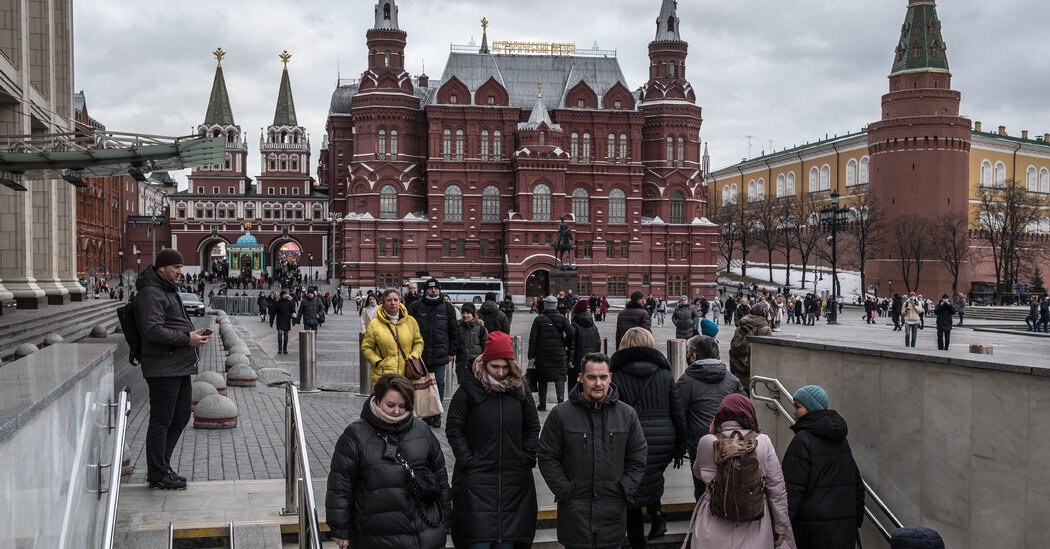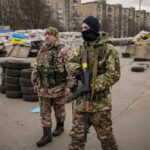
As Russia’s invasion of Ukraine grinds on, Moscow is finding itself mired in a parallel conflict: a contest of economic and political endurance against the West.
Vladimir V. Putin, Russia’s president, had prepared Russia for sanctions like those imposed after Russia’s 2014 annexation of Crimea, as if daring Western countries to cut off their citizens from Russian trade and see who blinked first.
But the severity of Western measures has far exceeded expectations, not only devastating Russia’s economy but also isolating its citizens from travel and even from Western brands like Apple and McDonald’s.
Now, both sides face a test of their ability to maintain domestic support for a standoff whose costs will be borne by regular citizens. More than a battle of wills, it is a test of two opposing systems.
Mr. Putin’s Russia, which rallied around nationalist fervor in 2014, now relies on propaganda and repression. Western leaders increasingly appeal to liberal ideals of international norms and collective welfare that had been in global decline — until now, they hope.
The economic balance favors the West in the extreme. One study estimated that a full trade war would curb the combined gross domestic product of Western countries by 0.17 percent, but Russia’s by a devastating 9.7 percent.
Public opinion may also advantage the West, where surveys find wide support for harsh measures against Russia, whereas Mr. Putin dare not even acknowledge the war’s extent for fear of triggering more protests.
Still, Western leaders must maintain unity across 20-plus fractious democracies, persuading citizens from Canada to Bulgaria that spiking energy prices — which may be just the start of the economic shocks — are worth the sacrifice.
Political fissures will inevitably open within the West, said Jeremy Shapiro, the research director for the European Council on Foreign Relations.
“The polls really tell us nothing about how people will actually react to economic pain and masses of refugees,” Mr. Shapiro said. The question is when.
Mr. Putin, meanwhile, must maintain his grip on both Russia’s public and the network of political power brokers who back him. If their tolerance of the war’s rapidly rising toll slips before Western resolve does, it could imperil not just his war, but his very hold on power.
The question of who breaks first may shape Ukraine’s fate as much as any weapons transfer or tank assault. And though the outcome is impossible to predict, a range of economic indicators and political signals offer some clues.
The West’s Challenge
Western countries’ secret weapon, nearly as important as their economic edge, may be their citizens’ sudden desire for concerted and unified action.
In polls, Europeans across the continent express a moral imperative to punish Russia’s invasion, as well as a belief that Russia now poses a direct threat to their countries.
In a seven-country survey taken just before the invasion, a plurality said they were willing to personally bear the economic toll of isolating Russia, which provides much of Europe’s energy. Country-specific polls suggest that share has likely increased.
In Germany — the European Union’s largest economy and often its decider on Russia matters — only 38 percent supported increasing military spending as of September, now it is up to 69 percent.
In past standoffs, European leaders often went against the will of their voters to confront Moscow, seeing it as a grim necessity.
Now, leaders like Olaf Scholz of Germany and Emmanuel Macron of France are seeing their approval ratings surge as they rally against Russia. Far from playing down the costs to everyday citizens, some emphasize it as a point of pride.
Political risks are further eased by the election calendar: Mr. Macron is nearly alone among Western leaders in facing re-election this year and is a strong favorite to win.
Still, a slowdown in Russian energy exports — already underway as Russian firms are buffeted by the turmoil — is expected to hit Europe hard. Germany imports more than half of its gas from Russia, as does Austria. Some Eastern European countries run on nearly 100 percent Russian gas.
Europe’s West gets most of its gas elsewhere, such as from Norway and Algeria. Still, as Russia is cut off from buyers, fossil fuels will become scarcer and therefore costlier worldwide. Some Germans’ energy bills are already projected to increase by two-thirds this year.
To ease the burden, European governments are putting in place sweeping energy subsidies, worth 15.5 billion euros, or about $17 billion, in France, €5.5 billion in Italy, €2 billion in Poland, €1.7 billion in Austria, and so on. Many target low-income households.
But there may be a timer on Western resilience. Unless European countries radically re-engineer their infrastructure for importing gas or take on perhaps the fastest shift to renewable energy in history — both considered technically feasible but costly — they could potentially run out of fuel next winter.
Economic shocks could extend well beyond heating costs. A number of European industries are already slowing production because of rising energy prices. Russia also exports much of the world’s copper and other industrial materials.
At the same time, while Europeans express wide support for welcoming Ukrainian refugees, it is unclear whether this will last.
Europe is already expecting a major surge in refugee arrivals this summer, many from Afghanistan. Western leaders have proved extremely sensitive to anti-immigration backlash.
“There remain significant divides that are being buried in the emotion of the moment,” Mr. Shapiro said.
The West’s greatest ally in maintaining unity may be Mr. Putin himself. By massing forces on NATO’s borders and producing shocking images of destruction in Ukraine, he has given Europeans something to rally against, distracting from their disagreements, for now.
Russia-Ukraine War: Key Things to Know
Chernobyl nuclear facility. The International Atomic Energy Agency said that the defunct power plant had been disconnected from electricity, though there was no need for immediate alarm. A power loss could affect the facility’s ability to keep the water that cools radioactive material circulating and lead to safety issues.
Moscow’s Challenge
In a telling contrast to 2014, when many Russians cheered their country’s invasion of Ukraine, Mr. Putin has turned almost immediately to repression and censorship, threatening severe prison terms for so much as calling the invasion a “war.”
This has accelerated a kind of authoritarian feedback loop in Russia, with tightening repression feeding popular discontent, beyond even the extremes of recent years.
But Mr. Putin belongs to a particular club of authoritarians — individual strongmen, rather than military or party dictatorships — for whom popular support is a secondary concern.
Rather, such leaders draw their power from the backing of political elites, like the heads of security agencies or state industries, said Erica Frantz, a Michigan State University scholar of authoritarianism.
“This is not to say that ordinary citizens don’t matter, but rather that if we’re looking for regime vulnerabilities at the moment, the focal point really needs to be on these indicators of elite discontent,” Dr. Frantz said.
Authoritarian elites, garrisoned behind vast personal wealth, can more easily endure the economic hardship that will be borne by regular Russians. They also tend to give leaders wide latitude in wartime, which may be why strongmen rarely lose power because of battlefield losses, research has shown.
Still, such elites are not fooled by state propaganda. And they are not indifferent to their country’s fate.
Surveys of Russian political elites conducted in 2020 found that most backed Mr. Putin for exactly the accomplishments now under threat: stabilizing the country and winning it respect abroad. Many also expressed concern over his handling of the economy — and opposition to military adventurism in Ukraine.
“The crisis will be most severe for a minimum of three years. Take the 1998 crisis and multiply it by three,” Oleg Deripaska, a prominent Russian billionaire, said in an unusual break with the Kremlin, referring to Russia’s economically catastrophic 1990s.
Sanctions could hurt Mr. Putin with the elite by limiting his ability to distribute the spoils they expect in return for their support. So could popular unrest, if it grows severe enough to make those elites question whether Mr. Putin is imperiling Russia’s stability.
“Russian public opinion is becoming such a problem that Putin is effectively fighting two wars: one in Ukraine, and one at home,” Sam Greene, a Russia scholar at King’s College London, wrote this week.
The danger is not only antiwar protests, which have been mostly associated with segments of society already skeptical of Mr. Putin. Bank runs or other forms of mass economic panic, Mr. Greene argued, could trigger a sense of national crisis, overriding even the sanguine lies of state media.
Mr. Putin, by hiding the scale and nature of the invasion, is in effect tying his own hands, making it impossible for his government to adequately inform citizens about the struggles ahead. You can’t ask citizens to rally around a war you insist does not exist.
Much as European disunity is all but inevitable as the tolls mount, apprehension among the Russian elite may simply be a matter of time.
“The indicators of elite discontent that we have seen thus far are unusual in Putin’s Russia and should therefore be taken seriously,” Dr. Frantz said, referring to comments by Mr. Deripaska and a few others.
Though she stressed that Mr. Putin could well ride out the self-made crisis, “in the long term, this external pressure — coupled with the domestic unrest — could lead to Putin’s downfall.”




